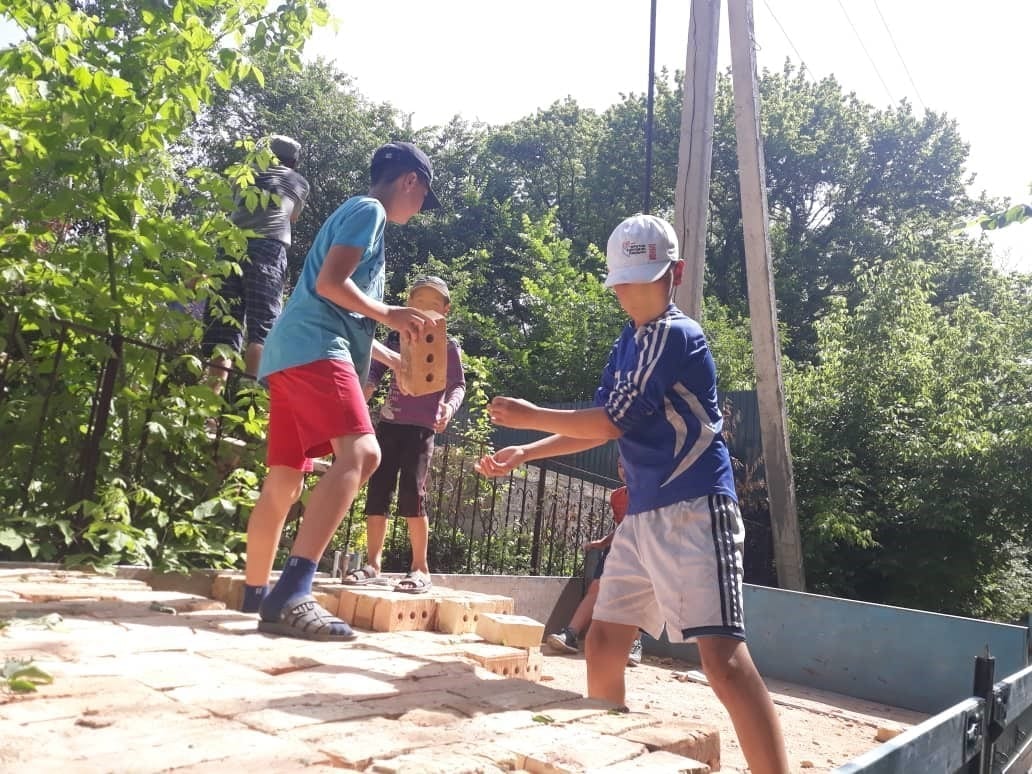
Oct 3, 2018
A survey conducted this year by the Kyrgyzstan Federation of Trade Unions (KFTU), including unions representing mining and construction workers, found that laws against child labor in the country are inadequate and implementation is uneven, resulting in more than 250,000 children being subjected to hazardous work as recently as 2014—10 years after the country ratified the International Labor Organization convention for elimination of the worst forms of child labor. The KFTU’s survey contributed to a scheduled ILO review of core labor standards in the country.
“The engagement of underage citizens of our republic in the worst forms of child labor is an urgent problem,” concluded the KFTU.
Through interviews conducted by Insan Leilek Social Foundation in Sulyukta this year, supported by the Solidarity Center, KFTU found that many children in the area began working in mining as early as age 8, to help support their families. These children, says the KFTU, are denied a complete education, suffer “abusive treatment” and deteriorated health because of inadequate medical care and lack of protection by government agencies.
Mubarak, an 11-year-old girl living in Ak-Turpak village, said about her neighbor: “[He] on purpose summons all the neighboring children to work in his rice paddies. In the rice fields they stand up to their knees in water all day.”
The greatest contributor to child labor, says the KFTU, is lack of enforcement of laws in the informal economy and agriculture. Children are most commonly found working in street trading, domestic labor, cottage industries and agriculture, especially the cultivation of cotton, rice and tobacco.
A 2014 medical study cited by the KFTU found that 8- to 14-year-old market workers on average lifted and hauled more than 1,717 pounds per day, while 15- to 16-year-old children handled an average of almost 3,000 pounds per day.
Nearly half of the children in the countryside (48.6 percent) work, according to government statistics, and the jobs are often hazardous. Children in fields are exposed to pesticides and chemical fertilizers without protective clothing or safe-handling protocols. Citing a 2017 report by the Office of Akyikatchi (Ombudsman) of the Kyrgyz Republic, KFTU describes how children engaged in cotton cultivation that year spent more than 90 percent of their 10- to 12-hour workday in a bent position, with each child bending an average 9,000 times per day. Children engaged in rice cultivation spent more than 70 percent of their 10- to 12-hour workday with the upper body bent, with each child bending an average 19,440 times per day.
To combat the worst forms of child labor, KFTU recommends that the government create a dedicated state program for eliminating the worst forms of child labor—one which welcomes input from civil society. Other recommendations include governmental monitoring of child labor, increased legal penalties for violation of child labor laws, a government-funded campaign to educate citizens about the harmful effects of child labor and the creation of a coordinating council headed by high-ranking government officials of the Kyrgyz Republic.
The survey resulted from a Solidarity Center training for KFTU affiliates on international labor standards, during which participants developed an action plan for submitting workers’ commentary on child labor in Kyrgyzstan to the ILO.
Of the 152 million children forced to work around the world, nearly half—73 million—are engaged in hazardous work.
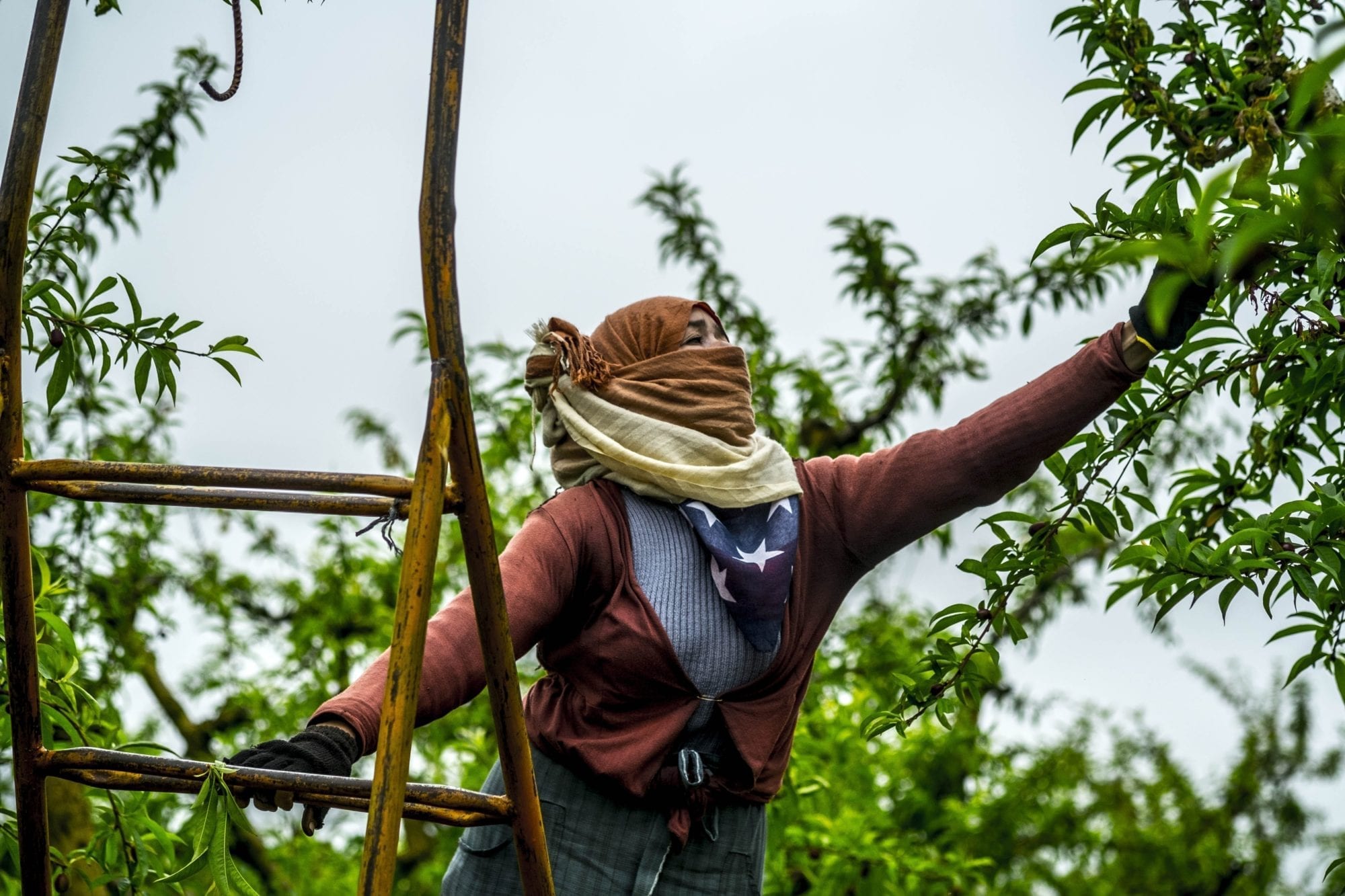
Sep 24, 2018
Farmworker rights advocates, policymakers and agricultural workers from Mexico, Morocco, Tunisia and the United States are set to share strategies to build worker power, create decent work in the fields and demand greater justice across global food chains in Los Angeles October 11.
The conference, “Realizing a More Fair Global Food Supply Chain,” will explore farmworker organizing strategies, alliances to support worker rights across the food chain, legal initiatives to ensure decent work and the importance of workers in the advancement of sustainability and justice as our food moves from farm to table.
The event, which takes place Thursday, October 11, 2018, at the UCLA Downtown Labor Center, 675 S. Park View St, Los Angeles, CA 90057, is sponsored by the Food Chain Workers Alliance, Solidarity Center and UCLA Labor Center.
Agenda
8:30 a.m. –9:00 a.m.
Continental breakfast
9:00 a.m. – 9:30 a.m.
Opening and welcome
- Art Pulaski, Executive Secretary-Treasurer and Chief Officer, California Labor Federation.
- Kent Wong, Director, UCLA Labor Center
- Shawna Bader-Blau, Executive Director, Solidarity Center
9:30 a.m.– 11:00 a.m.
Building Power in the Fields
Union activists from Mexico, Morocco and Washington state will share farmworker organizing strategies.
- Ramon Torres, President, Familias Unidas por la Justicia (Burlington, WA)
- Saida Bentahar, Collective Bargaining Committee, Workers Democratic Federation (CDT, Morocco)
- Abelina Ramirez Ruiz, Secretary of Gender Equality,
National Independent and Democratic Union of Farmworkers (SINDJA, Mexico)
Moderator: Gaspar Rivera-Saldago, UCLA Labor Center
11:00 a.m. – 11:15 a.m.
Coffee break
11:15 a.m.– 1:00 p.m.
Strategy Session
Worker rights and sustainable food advocates will examine models of cooperation and strategies to strengthen agricultural workers through alliances across the food chain.
• Joann Lo, Co-Director, Food Chain Workers Alliance (Los Angeles, CA)
• Clare Fox, Executive Director, Los Angeles Food Policy Council
• Ryan Zinn, Regenerative Projects Manager, Dr. Bronner’s
Moderator: Robert Egger, President, LA Kitchen
1:00 p.m. – 1:30 p.m.
Lunch (catered, on location)
1:30 p.m. – 3:00 p.m.
Strategy Session
Panelists will offer a global perspective on legal initiatives and strategies to support decent work and rights for workers in agriculture.
• Sami Tahri, Member-Executive Office, UGTT (Tunisian labor federation)
• Adrienne DerVartanian, Director of Immigration and Labor Rights, Farmworker Justice (Washington, DC)
Moderator: Jeff Vogt, Director, Rule of Law, Solidarity Center
3:00 p.m.–3:15 p.m.
Break
3:15 p.m. – 5:00 p.m.
Closing: What’s next?
Participants will explore the future of workers building power and voice in sustainable food chains while ensuring fairness and sustainability in agriculture supply chains.
• Sarah Gammage, Director of Gender, Economic Empowerment and Livelihoods, International Center for Research on Women (ICRW)
• Azusena Favela, Director of Programs and Operations, Leadership for Urban Renewal Network (LURN)
• Rusty Hicks, President, Los Angeles County Federation of Labor, AFL-CIO
• Lorenzo Rodríguez Jiménez, General Secretary, National Independent and Democratic Union of Farmworkers (SINDJA, Mexico)
Moderator: Shawna Bader-Blau, Solidarity Center
6:00 p.m.– 8:00 p.m.
Reception: UFCW Local 770, 630 Shatto Place, Los Angeles, CA 90005
RSVP to: [email protected]
Learn more!
Fact Sheet: Women Workers in Agro-Industry
The Human Pain in Every Morsel You Eat [Podcast interview with Solidarity Center Executive Director Shawna Bader-Blau, min. 5:00]
Global Supply Chains: Not Every Job Is a Good Job
Modern Slavery in Company Operation & Supply Chains
Decent Work in Global Supply Chains
The Rights to Freedom of Peaceful Assembly and Association in the Workplace
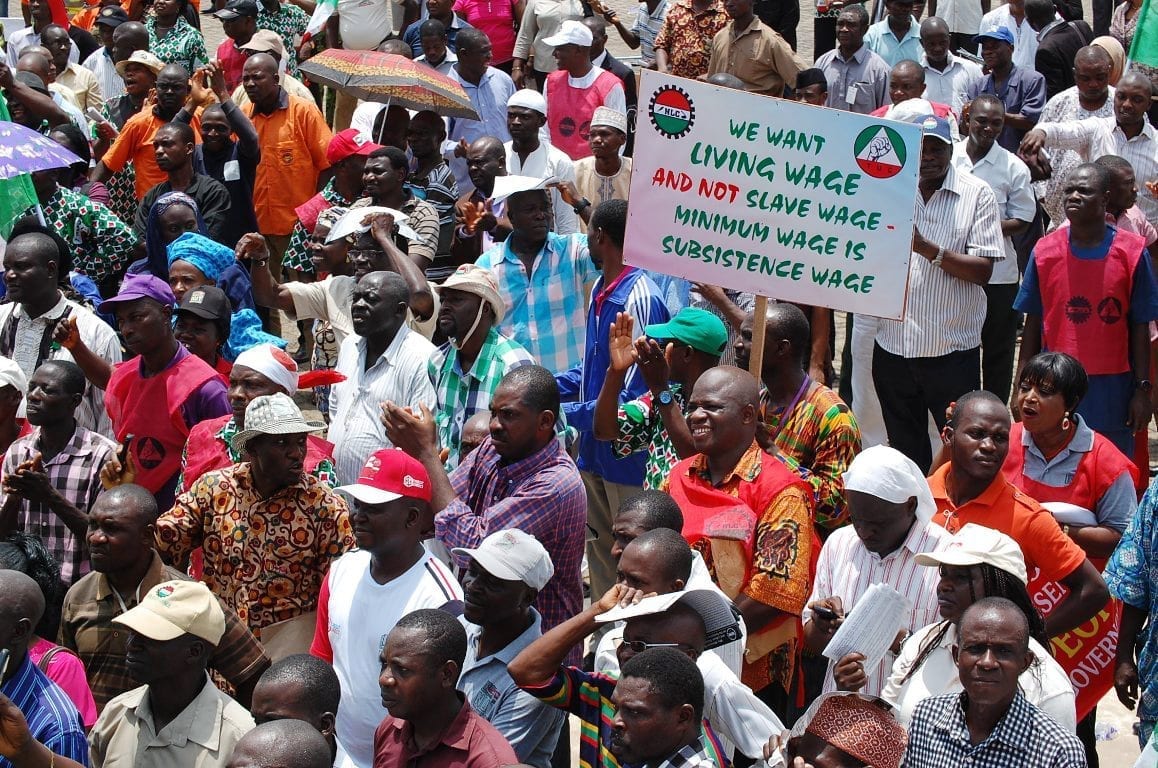
Sep 23, 2018
Nigeria’s labor federations—the Nigeria Labor Congress (NLC), the Trade Union Congress (TUC) and the United Labor Congress of Nigeria (ULC)—called for a national strike starting at midnight last night to protest stalled negotiations with the government for an increased minimum wage for all workers in the country.
Should the strike continue, all public-sector institutions, including schools and hospitals, could be affected. The strike might involve as many as 4 million workers, including Nigeria’s two oil unions, said Peter Ozo Eson, an NLC spokesperson.
“[W]orkers across the country are angry,” said Iboro Ibara, NLC vice chairman in Akwa Ibom state.
The country’s current minimum wage—$49.60 per month—is not a living wage, say workers, and must be raised to compensate for increased commodity, gasoline and other cost of living increases due to hyperinflation.
The NLC called for a strike starting at midnight last night by “workers from all sectors of the economy and our civil society allies” to pressure the federal government to reconvene the country’s tripartite minimum wage committee. The committee meets so that workers, government and employers can consult on Nigeria’s national minimum wage. The strike was triggered when the government allowed labor’s 14-day ultimatum to reconvene the committee to elapse today.
“This strike is a direct result of the failure of the minimum wage committee to find a way forward,” said Craig Phelan, director of Solidarity Center programs in Nigeria.
UPDATE: The NLC suspended the nationwide strike yesterday in response to news that the federal government will reconvene the tripartite minimum wage committee this week, on October 4 and 5. The NLC credited workers’ “substantial compliance” with the strike for government agreeing to meet.
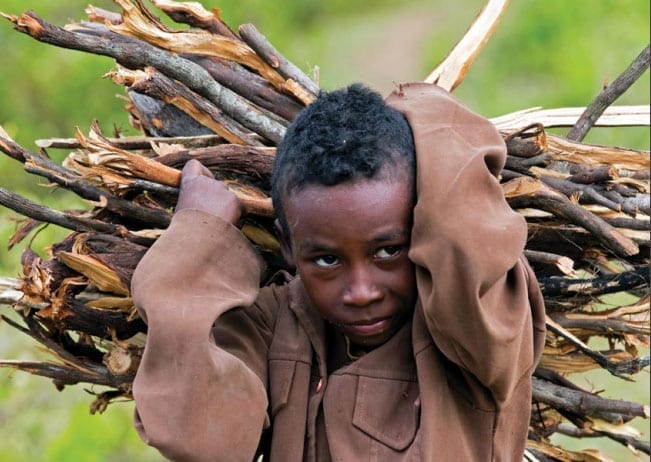
Sep 21, 2018
Of the 152 million children forced to work around the world, nearly half—73 million—are engaged in hazardous work, which includes dangerous, unsafe working conditions, and work that exposes children to physical, psychological or sexual abuse, according to the U.S. Department of Labor 2017 Findings of the Worst Forms of Child Labor report released yesterday. In 2015, 168 million children labored worldwide.
Most child labor—some 70 percent—occurs in agricultural
sectors, but it takes place in all industries. While the global trend in child
labor is downward, in sub-Saharan Africa the proportion of children in child
labor is actually rising—with one in five children engaged in child labor,
according to the report. Some 48 percent of child laborers were younger than
age 12.
The report also assesses countries’ progress in reducing child labor and found that three countries—Burma, Eritrea and South Sudan—received a “no advancement” assessment due to their government’s direct or active involvement in forced child labor. In total, 12 countries were assessed as making no advancement.
After years of receiving an assessment of “no advancement” for the forced mobilization of children in the cotton harvest, Uzbekistan received a “moderate advancement” for progress in reducing child labor. But the U.S. Department of Labor continues to call for an end to the mobilization of adult forced labor in cotton harvests. The Dominican Republic also received an assessment of “moderate advancement” because, in contrast to previous years in which it received an automatic “minimal advancement,” no cases were reported of children withoutidentity documents being denied access to education, an unlawful practice that mainly targeted children of Haitian descent.
Eswatini (formerly known as Swaziland), moved from “no advancement” to “minimal advancement” because there was no evidence in 2017 that local chiefs were forcing children to perform agricultural work or other tasks through kuhlehla, a customary practice that requires residents to carry out communal work, including in chiefs’ houses or fields.
The report highlighted work by the Global March on Child Labor, which organized a virtual march in May and June 2018 to commemorate its 20th anniversary and spread awareness about hazardous child labor and the safety and health of young workers. The Global March, a Solidarity Center partner, is headed by Kailash Satyarthi, who won a Nobel Prize in 2014 for his lifetime commitment to the cause of eradicating child labor. Solidarity Center Asia Regional Director Tim Ryan chairs the Global March board of directors.
The Labor Department also released its annual List of Goods Produced by Child Labor or Forced Labor, which documents more than 140 goods produced by child labor or forced labor in violation of international standards. Ten new goods were added to the 2018 list, including amber, cabbage, carrots, cereal grains, lettuce and sweet potatoes.
The “Worst Forms of Child Labor” report is required under
the 2000 Trade and Development Act (TDA), and the List of Goods Produced by
Child Labor or Forced Labor was first published in 2008, as mandated by the
Trafficking Victims Protection Reauthorization Act. Both acts aim to promote
global economic growth and build strong international trade partnerships that
hinge upon the reduction of child labor, forced labor and human trafficking.
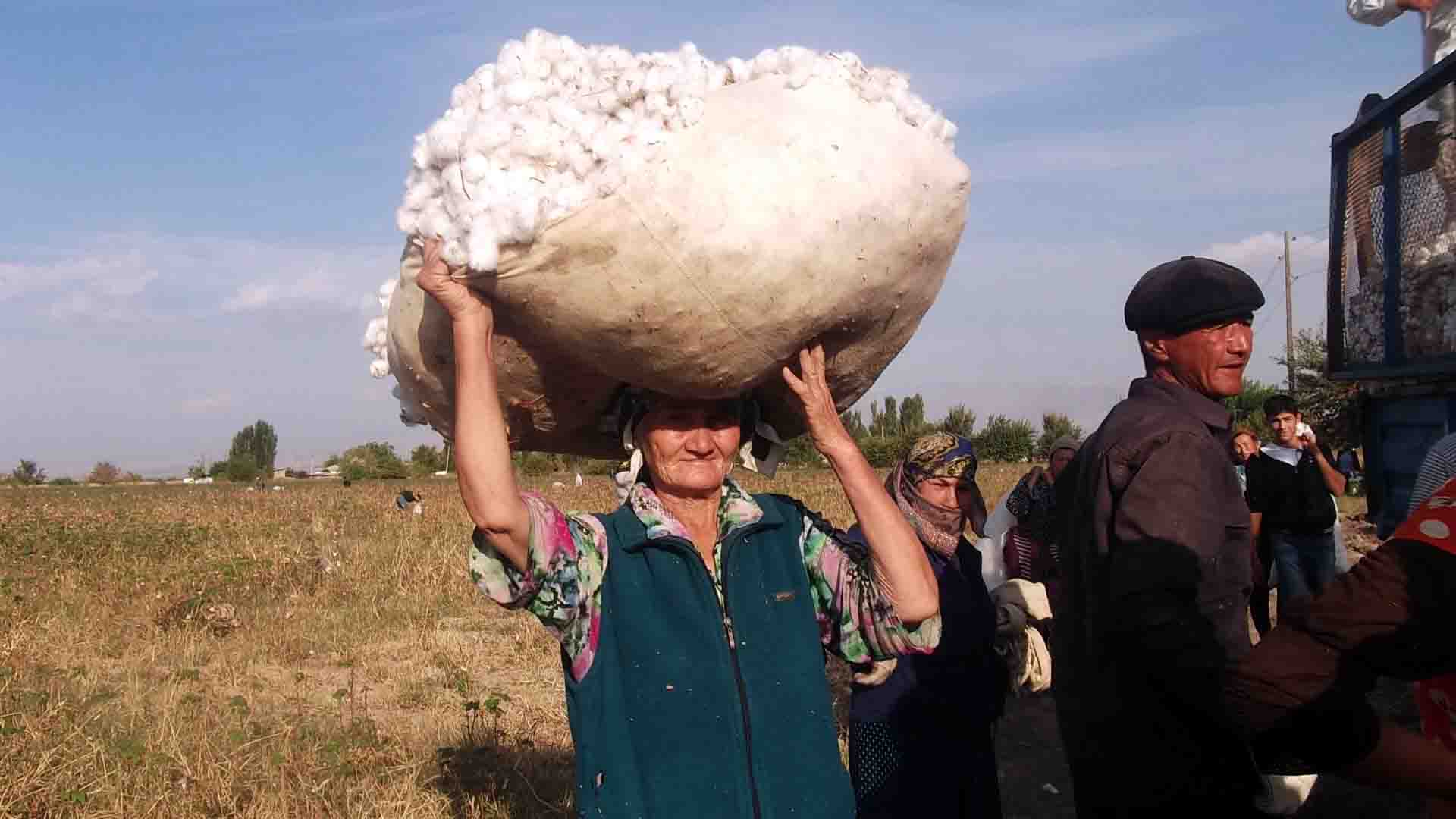
Sep 10, 2018
For the first time in years, large numbers of public-sector employees were not forced to carry out spring fieldwork in Uzbekistan’s cotton fields, although instances of child labor and forced labor were documented, according to a new report by the Uzbek-German Forum (UGF).
Despite progress, “No Need for Forced Labor when Farmers are Empowered to Pay Decent Wages: Spring Cotton Fieldwork 2018” finds that the government-run system of forced cotton production remains in place.
“The shift from the mobilization of workers in education and healthcare institutions to mostly voluntary labor to prepare fields this spring is significant and should be commended,” said Umida Niyazova, UGF executive director. “It is clear that structural problems remain, however.”
“Further scrutiny and careful monitoring will be required during the 2018 harvest to see how far those changes have actually gone in ending forced labor in Uzbek cotton production, and what still remains to be done,” Niyazova continued.
New Policies Enable Farmers to Hire Voluntary Workers for Spring

Human rights activist Fakhriddin Tillayev (right) was among political prisoners Uzbekistan released this year. Credit: Solidarity Center
This spring, seven monitors for the Uzbek-German Forum conducted site visits to farms, schools, colleges, clinics, hospitals, banks, markets and local government agencies and interviewed dozens of farmers, education and medical workers, children, union leaders and local government officials.
The monitors found no large-scale organization of forced labor as occurred in past spring weeding seasons. Those who still reported being forced to work included the guards, cleaners, librarians and specialists at schools in the Bayavut district, who said that they weeded cotton fields for 15 to 20 days in May and June.
The report cites two factors behind the reduction in forced labor this spring, including higher procurement prices set by the government. Farmers are required to sell their crop to the government for a set price, and the government this year raised the price from $370 to $706 per metric ton. And for the first time, farmers were allowed to receive cash from banks. With more access to cash and higher payments, farmers are less reliant on unpaid labor for the springtime work required to produce cotton quotas set by the government.
Despite these improvements, farmers also described an overall lack of autonomy and intrusive, punitive oversight by local authorities who impose crop quotas. Penalties for missing those quotas can be severe, including physical violence and loss of one’s land, and state agents apply enormous pressure for them to be met. One farmer said to monitors: “The public prosecutor screams, ‘Quickly plant cotton.’ He threatens, he says, ‘or else I’ll have a criminal case against you.’”
In recent months, the government of Uzbekistan has been willing to talk about reducing forced labor and began releasing political prisoners, including worker rights activists.
“We are seeing unprecedented change in Uzbekistan right now, after a decade of international pressure. We hope respect for workers’ rights, especially ensuring fundamental rights for workers to organize together and negotiate for better working conditions, will follow,” said Solidarity Center’s Eastern Europe/Central Asia Director, Rudy Porter.
The Cotton Campaign, of which Solidarity Center is a member, developed a roadmap for the government of Uzbekistan to dismantle the forced labor system of cotton production, which was presented to government officials during high-level meetings in Tashkent in May 2018.







